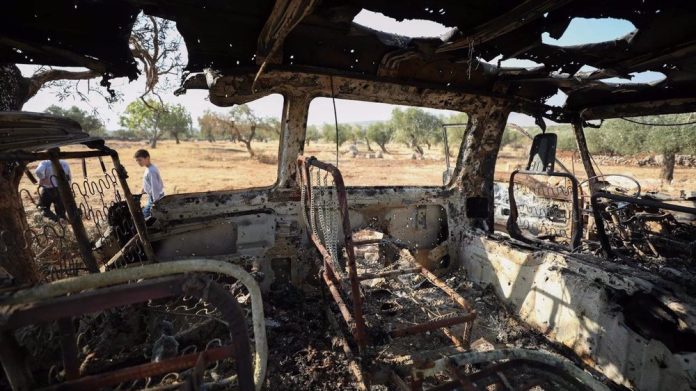A set of recently released classified documents dismissed Pentagon claims that a deadly 2019 U.S. military airstrike against the Syrian hideout of the terrorist group Daesh leader caused no civilian casualties.
A classified document released Friday by National Public Radio (NPR) shed new light on the U.S. special forces attacking northern Syria’s Idlib province that prompted the suicide bombing of Ibrahim al-Samaralai, also known as Abu Bakr al-Baghdadi.
The media organization said it had received a redacted copy of the Department of Defense’s 2020 classified report on the incident.
Documents, including aerial photos, of the Oct. 26, 2019 operation, reviewed by NPR, found that US helicopter fire “killed and severely injured” Syrian “civilians” during the attack, although the Pentagon claimed those soldiers were enemy combatants who ignored warning shots.
“US troops fired warning shots mere seconds before launching airstrikes on the Syrian men’s van; this undermines the military’s assertion that the men demonstrated hostility by failing to stop or change course,” the documents said.
“The Pentagon provided no evidence that the victims were enemy combatants beyond the split-second assessment by US troops on the dark night of the raid,” they added, stressing that the US officials did not compile an intelligence dossier to support the claim that the victims were “unlawful enemy belligerents.”
General Kenneth McKenzie, the commander of the operation, claimed days after the October raid on Baghdadi’s whereabouts that the van “displayed hostile intent, came toward us, and it was destroyed.”
The lone survivor of the airstrikes, Barakat Ahmad Barakat, now 39, was cited by NPR as saying that he and two friends were working as agricultural laborers at an olive press and that the friends were driving him home in their van.
Unaware of Baghdadi’s hideout and the presence of American forces, Barakat said they were startled to come under US airstrikes, fled the van, and were targeted again.
“There was nothing suspicious at all. We kept moving normally. There was nothing ahead of us on the road,” Barakat said. “Suddenly I felt something hit us.”
Barakat’s two friends, Khaled Mustafa Qurmo, 27, and Khaled Abdel Majid Qurmo, 30, were killed in the airstrikes. Barakat’s right hand was blown off and his left hand was badly injured.
Former US President Donald Trump then formally announced at a White House press conference that al-Baghdadi had been killed in a US raid on his compound in Idlib province in northern Syria.
U.S. military officials insisted their forces were protecting noncombatants, and the then head of state described the attack as “impeccable.”
Syrian President Bashar al-Assad has cast doubt on President Trump’s claims that Daesh mastermind al-Baghdadi was killed in a US military operation, calling the widely publicized operation a “fantasia” by US forces.
Da’esh launched a terrorist campaign in Iraq in 2014, overwhelming much of the region with lightning strikes. Iraq declared victory over the terrorist organization in December 2017 after a three-year anti-terrorist campaign in which the PMU, known in Arabic as Hashd al-Shaabi, played a key role.
The terror group was defeated in Syria two years later under the leadership of Lieutenant General Qassem Soleimani, the commander-in-chief of the counter-terrorism organization. However, remnants of Daesh continue to carry out sporadic attacks across Iraq and are reorganizing in Arab countries to unleash violence.













